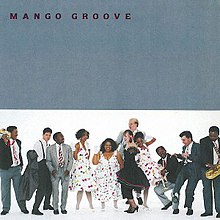
The Freddie Mercury Tribute Concert for AIDS Awareness was a benefit concert held on Easter Monday, 20 April 1992 at Wembley Stadium in London, United Kingdom for an audience of 72,000. The concert was produced for television by Ray Burdis, directed by David Mallet and broadcast live on television and radio to 76 countries around the world, with an audience of up to one billion. The concert was a tribute to Queen's lead vocalist, Freddie Mercury, who died of AIDS on 24 November 1991. The show marked bassist John Deacon's final full-length concert with Queen. The profits from the concert were used to launch The Mercury Phoenix Trust, an AIDS charity organisation.
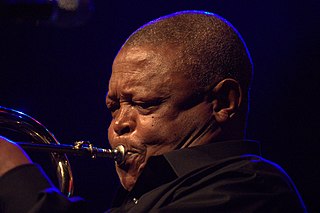
Hugh Ramapolo Masekela was a South African trumpeter, flugelhornist, cornetist, singer and composer who has been described as "the father of South African jazz". Masekela was known for his jazz compositions and for writing well-known anti-apartheid songs such as "Soweto Blues" and "Bring Him Back Home". He also had a number-one US pop hit in 1968 with his version of "Grazing in the Grass".
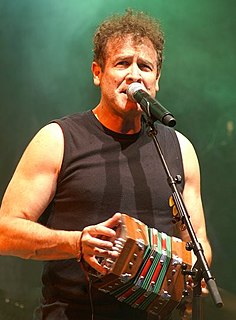
Jonathan Paul Clegg, OBE, OIS was a South African musician, singer-songwriter, dancer, anthropologist and anti-apartheid activist, some of whose work was in musicology focused on the music of indigenous South African peoples. His band Juluka began as a duo with Sipho Mchunu, and was the first group in the South African apartheid-era with a white man and a black man. The pair performed and recorded, later with an expanded lineup.

The South African music scene includes both popular (jive) and folk forms like Zulu isicathamiya singing and harmonic mbaqanga. South Africa has a global music industry.

Claire Johnston is an Anglo-South African singer and songwriter. She is the lead singer of the South African fusion band Mango Groove.
Mango Groove is an 11-piece South African Afropop band whose music fuses pop and township music—especially marabi and kwela.
Heat, Dust And Dreams is a studio album by South African artist Johnny Clegg and his band Savuka, released in 1993, produced by Hilton Rosenthal, co-produced by Bobby Summerfield. The album received a 1993 Grammy Award nomination for Best World Music Album.

Savuka, occasionally referred to as Johnny Clegg & Savuka, was a multi-racial South African band formed in 1986 by Johnny Clegg after the disbanding of Juluka. Savuka's music blended traditional Zulu musical influences with Celtic music and Rock music that had a cross-racial appeal in South Africa. Their lyrics were often bilingual in English and Zulu and they wrote several politically charged songs, particularly related to apartheid. Some better-known Savuka songs include "Asimbonanga", and "Third World Child", from their 1987 album Third World Child. Band percussionist Dudu Zulu was killed in 1992; their song "The Crossing" was a tribute to him.
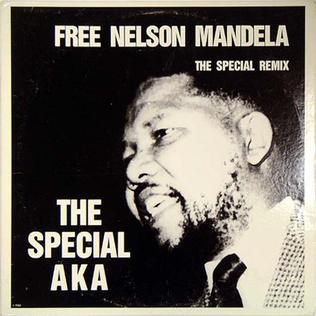
"Nelson Mandela" is a song written by British musician Jerry Dammers, and performed by band The Special A.K.A. – with lead vocal by Stan Campbell – released on the single "Nelson Mandela"/"Break Down The Door" in 1984.
Aaron "Big Voice Jack" Lerole was a South African singer and penny whistle player. Lerole was a leading performer in the kwela music of 1950s South Africa. Lerole was the bandleader of Elias and His Zig-Zag Jive Flutes, who had an international hit record in 1958 with "Tom Hark". He co-founded the fusion band Mango Groove in 1984, and later collaborated with Dave Matthews Band, a rock band from the United States.
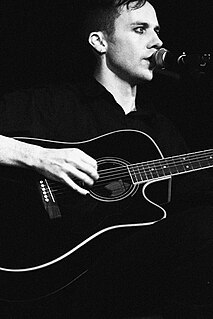
Ashton Nyte is a South African-born singer, songwriter, producer, composer and front man of the South African alternative rock band The Awakening. Nyte has released six solo albums both as Ashton Nyte and Ashton Nyte and the Accused in addition to his numerous releases as The Awakening. He is considered to be a pioneer of alternative music in South Africa, and has been described as "something of a musical genius" for his typical method of composing, playing and recording each instrument himself on most of his releases. Nyte is widely known in South Africa for his chart-topping cover of Simon and Garfunkel's "The Sounds of Silence" and several other top singles. His signature style combines baritone vocals akin to David Bowie and Johnny Cash, with instrumentation that ranges from alternative rock to post punk to Americana and even lo-fi indie rock. Nyte has been based in the USA since 2009.

Paradise in Gazankulu is an album by Harry Belafonte, released by EMI Records in 1988. As of 2020, it is Harry Belafonte's final studio album. The album deals with the plight of black South Africans under the Apartheid system. The album was re-released as an official mp3 download by amazon.com, and iTunes in the U.K. in 2010.
Alan Lazar is a South African-born composer and novelist. He has written music for more than 50 films and TV shows, including a string of Netflix movies. He was a member of the South African band Mango Groove and is the author of the book, ROAM. He became a US Citizen in 2010.

"Asimbonanga", also known as "Asimbonanga (Mandela)", is an anti-apartheid song by the South African racially integrated band Savuka, from their 1987 album Third World Child. It alluded to Nelson Mandela, imprisoned on Robben Island at the time of song's release, and other anti-apartheid activists. It was well received, becoming popular within the movement against apartheid, and was covered by several artists including Joan Baez and the Soweto Gospel Choir.

Mango Groove: Live in Concert is a concert video released by South African fusion group Mango Groove in 2011.

Bang the Drum is the fifth studio album by South African Afropop band Mango Groove. Released in September 2009, it was the band's first studio album since Eat a Mango in 1995.

Faces to the Sun is the sixth studio album by South African Afropop band Mango Groove. Released in October 2016, Faces to the Sun is a double album with more than a dozen featured artists. The first disc comprises renditions of major South African pop songs. Lead singer Claire Johnston described the selections as "personal favourites of ours" that are about what it means to be South African. The second disc features eight original songs, plus a remix of Mango Groove's cover of "Durban Road".

Eat a Mango is the fourth album by Afropop music group Mango Groove. It was released by Tusk Music in November 1995. In 1996, Eat a Mango won a SAMA in the category "Best Adult Contemporary Performance: English" at the second annual South African Music Awards. The band recorded music videos for three songs from the album: "Eat a Mango", "New World ", and "Right Time".

Hometalk is the second album by South African Afropop fusion band Mango Groove. The album was released in November 1990 by Tusk Music. It went gold upon release in South Africa, and has since reached platinum status. The title track, "Hometalk", was released as a single, followed by "Island Boy", "Taken for a Moment", and "Moments Away". The band recorded music videos for all four singles. One song, "We Are Waiting", was released several months early, in advance of Nelson Mandela's release from prison.

Another Country is the third album by South African Afropop fusion band Mango Groove. It was released in 1993, near the end of the negotiations to end apartheid in South Africa. The album was released in South Africa on cassette and CD by One World Entertainment, an imprint of Tusk Music.
